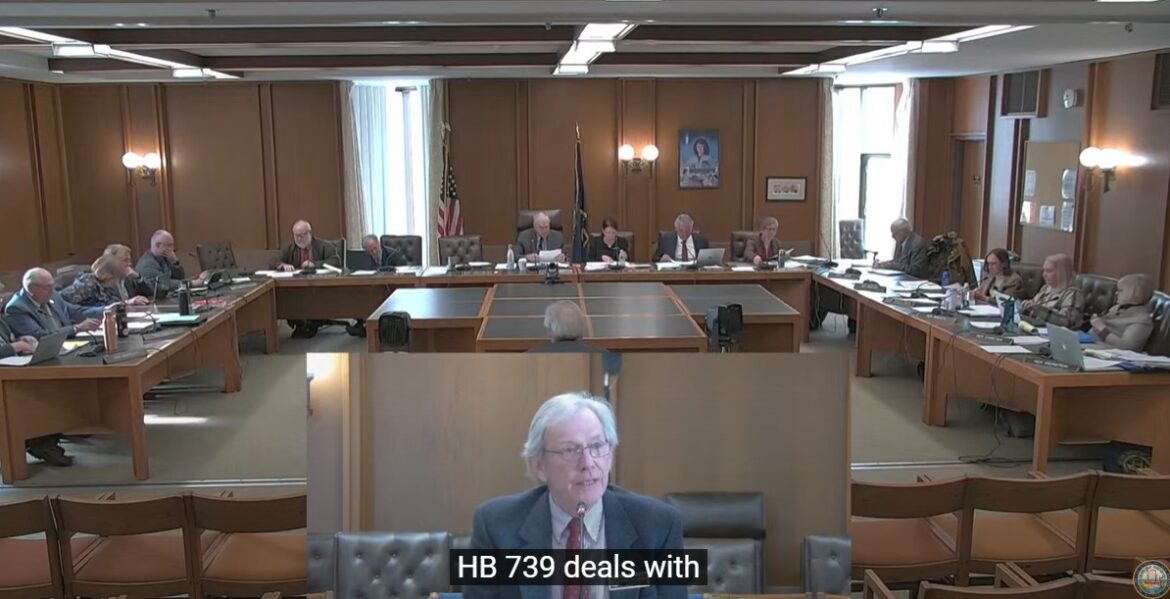By PAULA TRACY, InDepthNH.org
CONCORD – A bill that would change the way the state addresses excess funds paid to municipalities for the use of school districts went to a hearing Tuesday.
House Bill 739-FN, sponsored by Rep. Walter Spilsbury, R-Charlestown, is due out of the House Education Funding Committee in March along with several other bills that deal with education funding. At the end of the hearing, the chairman said it would be included in a discussion of what to recommend to the full legislature.
The online testimony submissions showed 3 in support and 46 opposed.
They are all in a bit of limbo as the New Hampshire Supreme Court is expected to rule on a court case that could impact the state adequacy formula for the years to come.
Rep. Spilsbury said the bill reinstates three provisions of law repealed in 2011.
The purpose of the bill was to deal simply and surgically with excess funds, Spilsbury said.
He noted court cases are expected to be ruled upon and the state needs to be ready to respond.
In December, 2024, the NH Supreme Court heard oral arguments in the so-called “ConVal lawsuit,” brought by multiple school districts that believe the state is not paying its portion of an adequate education, which is required in the state Constitution.
A Superior Court Judge, David Ruoff, agreed with the school districts in his 2023 ruling saying that the roughly $4,000 the state gives per pupil to districts should be more like $,7,356, based on 2023 dollars.
The Attorney General’s Office appealed the decision and is awaiting a high court ruling which could have major implications on the state’s budget with some believing it would add more than $500 million to state payments to districts.
Republicans, including Gov. Kelly Ayotte, have maintained that it should not be the court’s business to determine education adequacy but should be left to elected leaders in the legislature to decide.
Spilsbury said that a betting person might agree that the high court will at least partially side with Judge Ruoff and this bill could go towards addressing state requirements.
Education Funding Committee member state Rep. David Luneau, D-Hopkinton, was among several members who thanked Spilsbury for presenting a “clean bill” and said “if we are going to have a state property tax it should behave like a state property tax.”
Some pressed on the timing of the deadlines for notifications to municipalities and time needed to come to adequate numbers if there is excess SWEPT, which stands for statewide education property tax.
Bruce Kneuer, supervisor of the municipal bureau within DRA, said the timing would be similar to what is now expected.
“We have worked with an earlier deadline under the current law,” he said.
The bill would specifically focus on excess funds paid to municipalities for the use of school districts.
“This bill requires municipalities to remit any excess statewide education property tax to the state for deposit in the general fund,” it states.
Under RSA 198 it would be amended by inserting after section 47 “Any excess statewide education property tax shall be remitted to the department of revenue administration on or before March 15 of the tax year in which the excess occurs….the commissioner of the department of revenue administration shall collect from the municipality the excess tax and pay the excess tax over to the state treasurer for deposit in the education trust fund…”
The effective date would be July 1, 2025.
There is a current estimate there would be a decrease of approximately $28.6 million per year, the bill reads.
This bill requires that any excess statewide education property tax (SWEPT) be deposited to the state education trust fund (ETF). The term “excess SWEPT” is assumed to be the amount of a municipality’s SWEPT collection that exceeds the amount of its calculated cost of an opportunity for an adequate education.
Under current law, each municipality collects SWEPT on behalf of the state totaling approximately $363 million and retains the SWEPT locally as part of state education funding. Although the SWEPT is locally retained, the total amount of SWEPT collected by the municipalities is still recognized by the state as revenue to the ETF.
This bill would change this methodology, so that excess SWEPT revenue is deposited to the ETF as state revenue.
“The Department of Revenue Administration believes it could implement this bill without any new positions, however, there would be a cost associated with implementing the electronic filing and payment mechanism within the Department’s Revenue Information System and the Granite Tax Connect portal estimated at $300,000 in FY 2026,” it reads.





